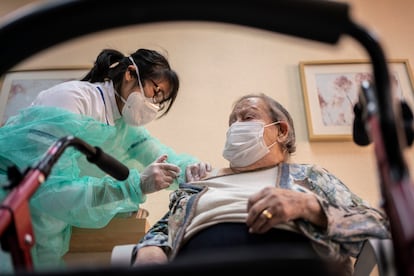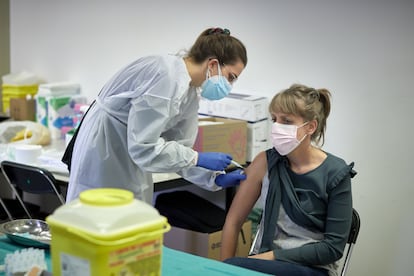Spain begins Covid-19 vaccination of people 80 and over
Seven regions are leading the inoculation campaign, which seeks to immunize 70% of the population before the end of the summer

At least seven Spanish regions are this week beginning to vaccinate people 80 years of age and over against Covid-19, while other parts of the country are still inoculating previous target groups.
Andalusia, Aragón, Murcia, the Canary Islands, Cantabria, Catalonia and the Valencia region have announced that they are ready to start vaccinating Spain’s most senior population, even as they continue to administer doses to people in the first priority group. This latter category includes residents and workers of care homes, healthcare workers and people in need of daily assistance who do not live in care facilities.
Galicia and Castilla-La Mancha said they will start targeting the 80-and-over population next week. Other regional governments have not yet announced a date, but are expected to begin inoculating this age group in late February or early March.
Andalusia and Murcia are converting large facilities such as sports pavilions and convention centers into vaccine administration points. Madrid and Catalonia have announced similar plans, but the general rule elsewhere is for people to be vaccinated at their local healthcare center or in their own homes.

While these groups are receiving the Covid vaccines from Pfizer-BioNTech and Moderna, a parallel vaccination drive has begun for essential workers under 55 years of age, who are getting jabs of the AstraZeneca vaccine after Spanish authorities decided not to recommend this particular treatment for older age groups.
The Health Ministry has reiterated that the pace of vaccination will ensure that 80% of those 80 and over will be immunized by late March. But regional governments have not ventured to offer specific dates. A spokesperson in Murcia said on Monday that the region’s most senior citizens will not be fully vaccinated for another month and a half at least, despite being one of the first regions to get started.
In the Valencia region, authorities have decided to further limit the 80-plus age group and will first administer doses to people who are over 90. Galician officials have left it up to chance: after drawing letters of the alphabet, they determined that people whose surname begins with an H will go first.
Larger shipments
Spain is expecting to receive four million vaccine doses this month. For now, both health officials and experts agree that slowdowns in vaccination are being caused by a shortage of available shots. Moderna has announced that it will deliver around 200,000 doses of its vaccine to Spain, around half as much as the country had been expecting to get this week. This reduction, which affects other EU member states as well, will be compensated for in March with larger shipments, said the Health Ministry.
By late February, regional governments will start receiving over one million doses a week. Around 2.1 million doses will have to be administered a week in the second quarter of the year in order to reach the overall goal of vaccinating 70% of the population before the end of the summer.
Until now, over 90% of available doses have been administered by the end of each week (shipments come in once a week). The increase in available doses will test the healthcare system’s ability to speed up the vaccination drive with existing resources.
When Spain starts accumulating more doses than it can administer, mass vaccination of the general population will get underway, but this is not likely to happen before April. A vaccination team may be made up of as many as eight people, who deal with patient records, vaccine handling and shot administration. Miriam Alía, head of vaccination at Doctors Without Borders (MSF) Spain, said that their own teams can normally administer over 1,000 doses in seven hours. But due to the peculiarities of the coronavirus vaccines and the protection measures required, this number goes down to around 200, said Diego Ayuso, of the General Nurses Council. And experts note that more personnel will have to be brought in to meet the government’s vaccination goals in time.
With reporting by B. Coll, I. Valdés, L. Bohórquez, G. Vega, L. Tolosa, S. Nortes, F. Bono, J. Navarro, P. Gorospe, C. Bermeo and E. Saiz.
English version by Susana Urra.
Tu suscripción se está usando en otro dispositivo
¿Quieres añadir otro usuario a tu suscripción?
Si continúas leyendo en este dispositivo, no se podrá leer en el otro.
FlechaTu suscripción se está usando en otro dispositivo y solo puedes acceder a EL PAÍS desde un dispositivo a la vez.
Si quieres compartir tu cuenta, cambia tu suscripción a la modalidad Premium, así podrás añadir otro usuario. Cada uno accederá con su propia cuenta de email, lo que os permitirá personalizar vuestra experiencia en EL PAÍS.
¿Tienes una suscripción de empresa? Accede aquí para contratar más cuentas.
En el caso de no saber quién está usando tu cuenta, te recomendamos cambiar tu contraseña aquí.
Si decides continuar compartiendo tu cuenta, este mensaje se mostrará en tu dispositivo y en el de la otra persona que está usando tu cuenta de forma indefinida, afectando a tu experiencia de lectura. Puedes consultar aquí los términos y condiciones de la suscripción digital.









































